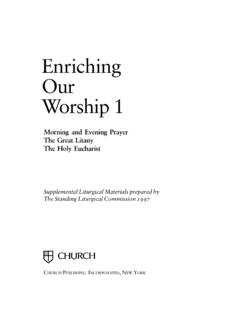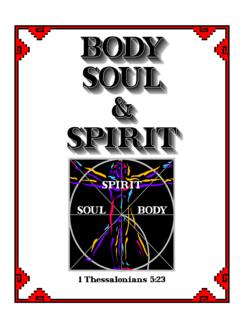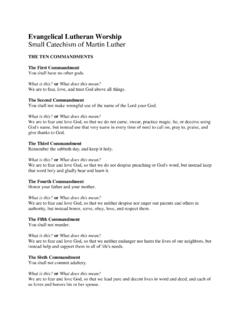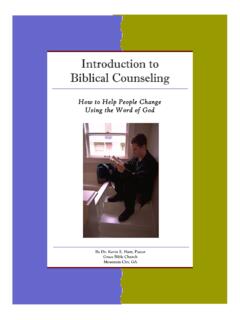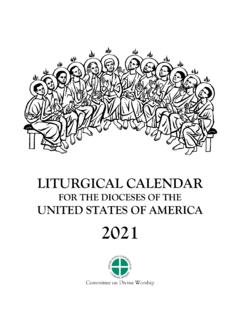Transcription of Introduction to Christian Ethics - SWORD OF THE SPIRIT ...
1 Introduction to Christian Ethics By Dr. Margaret Olubiyi, DBS This course introduces the student to the branch of Christian Theology that defines right and wrong behavior from a biblical perspective. It is an in-depth study of the moral principles required by God of His children in their homes, workplaces, local church assemblies, and the communities they live in. At the completion of this course, the student will understand the general concept of the field of Ethics , Christian Ethics , and how to develop a method by which they can deal with the moral and social issues that they will have to face in society as they interact with others.
2 Prerequisite: None Definition of Ethics Ethics is derived from the ancient Greek work ethikos meaning "relating to one's character. Some mistakenly use the terms " Ethics " and "morals" interchangeably, but they are not the same. The term "morals" comes from the Latin meaning "custom" or "habit." Morals are what people do. While the word " Ethics " term originated from the root word ethos meaning "character, moral nature." According to Merriam Webster dictionary, Ethics refers to the discipline dealing with what is good and bad and with moral duty and obligation.
3 It is the principles of conduct governing an individual or group. In summary, Ethics as a discipline is a systematic study concerned with the moral evaluation of human behavior. Principles of Ethics Across several fields or disciplines, it is standard practice to have a set of Ethics governing the employees' decision processes and behaviors in an organization. However, in general, there are four principles of Ethics widely accepted across disciplines in the United States and globally. They are: 1. Respect 2. Beneficence 3. Nonmaleficence 4. Justice 1.
4 Respect: We should respect other persons' autonomy, which is to recognize the decisions made by other people concerning their own lives. This act is also called the principle of human dignity. We are not to interfere in the decision making of adults who are competent to make their own decisions. 2. Beneficence This means taking the necessary steps to prevent harm. While still respecting others, individuals must make an effort to secure the well-being of others. Two standard rules have been conveyed as complementary expressions of beneficent actions in this sense: (1) do not harm, and (2) maximize possible benefits and minimize potential harms.
5 However, in complex cases, adopting this principle often puts us in direct conflict with respecting other people s autonomy. 3. Nonmaleficence - We have an obligation not to harm others: "First, do no harm." You will see this often apply mostly to practitioners or professionals in the medical or behavioral health field. Never encourage the participation of individuals in interventions or sessions that could result in harm to the individual. Where harm cannot be avoided, we are obligated to minimize the damage we do. Where possible, strive to reduce the risk of harm to others.
6 4. Justice - Everyone should be treated fairly and equally. As individuals, we must provide others with whatever they are owed or deserved. In public life, we have an obligation to treat all people equally, fairly, and impartially. Justice equals fairness, equal distribution of services, equal rights, and access to services, no discrimination. Injustice occurs when some benefit to which a person is entitled, is denied without good reason or when some burden is imposed unduly. Formal Approaches to Ethics Ethical Constructs Teleology The study of evidence of design in nature.
7 It is a fact attributed to nature or natural processes of being directed toward an end or shaped by a purpose. (derived from Greek words telos, (end or goal) and logos (reason). Some ethicists state that the appropriate approach to making ethical decisions is to begin by determining the highest or greatest good in life. If we take this approach, we start by looking for the one thing we would be willing to give up for everything else. The teleological approach to Ethics is concerned with how the choices we make will affect a particular desired moral outcome.)
8 An example of teleological Ethics , a thinker of this theory, might consider stealing to be okay if the goal or outcome is to feed one's family or feed the homeless, which is good, so the action is right. Deontology The study of the nature of duty and obligation (derived from the Greek words for deon (duty) and logos (reason). With this approach, some put duty first above value. Duty has to do with an obligation based on a relationship. When an individual acts from a place of duty, it is not to attain an objective, but they come from a place of commitment.)
9 , a soldier's duty to serve and protect his or her country. Satisfaction comes from doing one's duty. The deontological approach suggests that actions are good or bad, according to a clear set of rules. An example of a deontological approach to Ethics is the belief that killing is wrong, even if it's in self-defense. Deontology states that an act that is not good morally can lead to something good, such as a man who shoots an intruder to protect his family. So even though killing is wrong, protecting his family is morally right. (the outcome is good). Christian Ethics What is Christian Ethics ?
10 It is the comprehensive and systematic evaluation of human conduct from a Christian perspective or worldview. God's revelation in scripture guides Christian Ethics . It is defined by the Christian faith that characterizes and outlines who believers are, their behavior, and moral stance on societal issues. The Christian Ethicist approaches Ethics from the framework of the Christian faith and draws his or her conclusions from it. Christian Ethics asks the following questions: Should women have careers or jobs outside the home? Should a believer/ Christian approve of abortion regardless of the circumstances?

